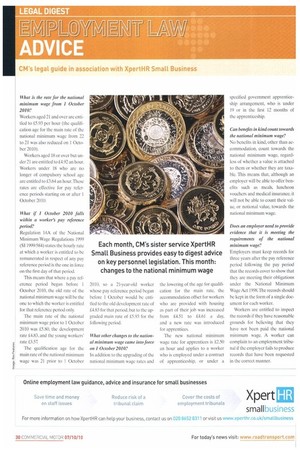! CM's Legal guide in association with XpertHR Small Business
Page 30

If you've noticed an error in this article please click here to report it so we can fix it.
What is the rate for the national minimum wage from 1 October 2010?
Workers aged 21 and over are entitled to £5.93 per hour (the qualification age for the main rate of the national minimum wage from 22 to 21 was also reduced on 1 October 2010).
Workers aged 18 or over but under 21 are entitled to £4.92 an hour. Workers under 18 who are no longer of compulsory school age are entitled to £3.64 an hour. These rates are effective for pay reference periods starting on or after 1 October 2010, What if 1 October 2010 falls within a workers pay reference period?
Regulation 14A of the National Minimum Wage Regulations 1999 (SI 1999/584) states the hourly rate at which a worker is entitled to be remunerated in respect of any pay reference period is the one in force on the first day of that period.
This means that where a pay reference period began before 1 October 2010, the old rate of the national minimum wage will be the one to which the worker is entitled for that reference period only The main rate of the national minimum wage prior to 1 October 2010 was £5.80, the development rate £4.83, and the young workers' rate 0.57.
The qualification age for the main rate of the national minimum wage was 21 prior to 1 October 2010, so a 21-year-old worker whose pay reference period began before 1 October would be entitled to the old development rate of £4.83 for that period, but to the upgraded main rate of £5.93 for the following period.
What other changes to the national minimum wage came into force on 1 October 2010?
In addition to the upgrading of the national minimum wage rates and the lowering of the age for qualification for the main rate, the accommodation offset for workers who are provided with housing as part of their job was increased from £4.51 to £4.61 a day, and a new rate was introduced for apprentices.
The new national minimum wage rate for apprentices is £2.50 an hour and applies to a worker who is employed under a contract of apprenticeship, or under a specified government apprenticeship arrangement, who is under 19 or in the first 12 months of the apprenticeship.
Can benefits in kind count towards the national minimum wage?
No benefits in kind, other than accommodation, count towards the national minimum wage, regardless of whether a value is attached to them or whether they are taxable. This means that, although an employer will be able to offer benefits such as meals, luncheon vouchers and medical insurance, it will not be able to count their value, or notional value, towards the national minimum wage.
Does an employer need to provide evidence that it is meeting the requirements of the national minimum wage?
Employers must keep records for three years after the pay reference period following the pay period that the records cover to show that they are meeting their obligations under the National Minimum Wage Act 1998.The records should be kept in the form of a single document for each worker.
Workers are entitled to inspect the records if they have reasonable grounds for believing that they have not been paid the national minimum wage. A worker can complain to an employment tribunal if the employer fails to produce records that have been requested in the correct manner.




























































































































